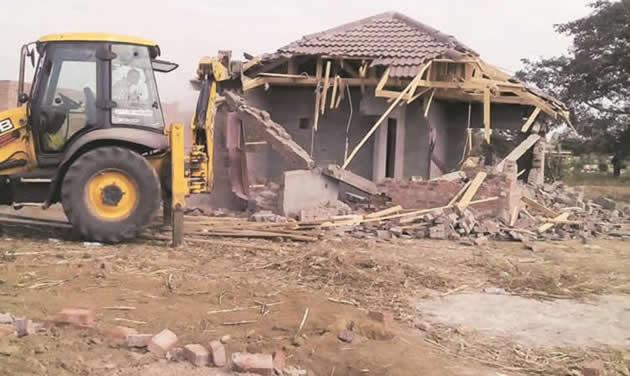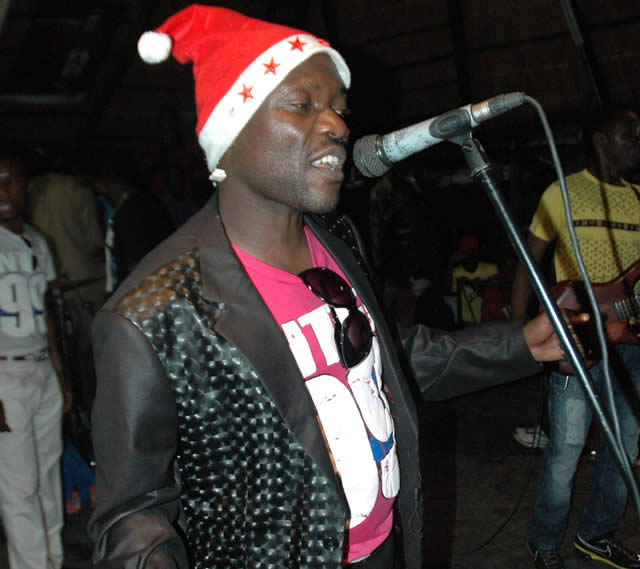Soma reflects on tears, laughter with Dhewa

Godwin Muzari Memory Lane
“Tongai Moyo called me to attend a show at Aquatic Complex at the beginning of October 2011. He was performing with a number of other big artistes and wanted me to be there although I was not part of the line-up. He said he just wanted me to attend the show.
“We met backstage when I arrived at the venue. I was shocked when I saw him. His physical appearance had changed in a few days. His face was swollen and he looked very frail.
“He embraced me and began crying with his head on my shoulder. It was my first time to see him shedding tears. It was an emotional incident. I was touched and I could not withhold my tears. We cried together for some minutes,” recalls Somandla “Soma” Ndebele as he narrates the journey of his friendship with the late Tongi “Dhewa” Moyo.
Dhewa was known as a strong character, but that time he was apparently realising he was losing his battle with non-Hodgkin’s lymphoma cancer, which eventually claimed his life two weeks later on October 15, 2011.
Soma said Dhewa cried because he was worried about his family. He was in pain but could not stop working because he had to take care of his wife and children. The inevitable reality that he would finally succumb to the disease exacerbated the pain.
“He finally calmed down and told me how he had been trying to call me for a week. I had gone to my rural home and my phone was not reachable. Tongai said he tried to phone me when he was going for his performance at Chibuku Road to Fame finals of that year. He said he wanted me to assist him with vocals on stage because the ailment had affected his voice.
“He looked at me and said:’Soma I am in pain. I need your support and that is why I called you here. The pain is getting worse each day but I cannot rest. I have to work for my family and I do not know how they will survive when I die. I am losing the battle.’”
The Aquatic Complex incident was one of the last meetings Soma had with Dhewa. The close friends also met the following day at another show at Harare Gardens before Dhewa was hospitalised.
Soma visited Dhewa several times in the next two weeks at St Anne’s Hospital. Soma says the meetings got more emotional as Dhewa’s condition deteriorated and it had become common for his friend to cry during conversations.
Dhewa died on a Saturday when Soma was at a show at Patchway Mine in Kadoma.
“I received a call announcing his death just before I went on stage. It was a hard night for me. I just performed to fulfill the contract, but it was the most difficult show in my career. I still had hope that he would recover and leave hospital as he had done many times before. It lost a true friend.”
That was the sad end of an eventful friendship that began in 1995.
The musicians first met at Gramma Records when Dhewa was recording “Vimbo” while Soma was in the studio for “Ziva Zvaunoda”.
“Vimbo” was Dhewa’s first album while Soma was recording his fourth release. Dhewa knew Soma’s music and they were both on a mission to breakthrough in an industry that had big names like Leonard Dembo, Marshall Munhumumwe, Simon Chimbetu, Oliver Mtukudzi, Khiama Boys, Leonard Zhakata and Thomas Mapfumo among others. As young musicians bound by the same mission, Dhewa and Soma started discussing their aspirations and careers.
They were to meet regularly at the studio as they were making their albums and a strong friendship gradually germinated.
By 1996, when “Vimbo” and “Ziva Zvaunoda” were released, the duo had started doing joint shows. The strength of their joint efforts saw them touring various parts of the country together. They also did shows in Mozambique and they became known as a combined band.Then, Dhewa was working as a clerk at Kwekwe Hospital and Soma was already a full-time musician.
Soma says they would communicate almost daily and every time he saw an incoming landline call with a Kwekwe code, he knew he would be on the line for some minutes with his friend.
He remembers how he would wait for Dhewa at a bus stop near Kuwadzana roundabout along Harare-Bulawayo highway and would take him to his house in Dzivaresekwa before they went on their adventures in the city.
“He favoured Tauya buses for his journeys. I would wait for him at the bus stop and we walked to my house in Dzivaresekwa through the fields that separate the suburb and Kuwadzana. We understood each other very well and I would help him do personal things in town when he was not coming for music business. We were still bachelors and he spent all his time in Harare at my place. I would also spend time at his place when I visited Kwekwe.”
“Vimbo” did well and Dhewa bought his first music kit and his first car (Nissan PG720). The friends continued doing live shows together. Although Soma had already done three albums with his group Denda Brothers, most of the time they both used one band – Dhewa’s Utakataka Express – to limit costs. Dhewa would actually play the lead guitar and do backing vocals on Soma’s songs.
The combination led to the recording of joint album “Mwoyo Wekurera” in 1999. The album did well, especially the hit track “Masimba aMwari”. Its video was one of the best that time. The album solidified the friends’ professional ties. In 2001 they did their second combined album titled “Chirangano”.
Soma laughs at how they would buy and wear shirts of same colours with matching cell phone pouches and would proudly walk around the city with the pouches hanging from their belts.
During tours, they would share rooms if there was limited accommodation and would sleep together in their Nissan PG720 when they were performing in remote areas. It is the same car that appears on “Masimba aMwari” video when they sing: “mota ikafa…” Dhewa used to always joke that they only took shots of the car’s engine for the quality of the video because the car was old by then.When their careers grew separately, the joint shows decreased as Dhewa was fast establishing himself as a strong musician in the industry while Soma also made his mark, especially with the album “Zvamauya Zvanaka”.
By the time of Dhewa’s death, they were rarely holding shows together although they constantly mentioned each other’s names in their songs. Despite different schedules, they remained good friends and would often buy similar cars. In 2004 they had similar BMWs while in 2010 they each bought a Nissan Presage, only differentiated by colour.
Their families were also close. When Soma’s parents were involved in a car accident in Kadoma in 2004, Dhewa was went ahead of Soma to visit them in hospital because he was also closer to the hospital geographically.
“Even when my father died, Tongai arrived at our rural home in Zhombe before me. That was how close we were.”
Although they first met when they were already adults, their backgrounds are similar as they were both born in Kwekwe and hail from the same rural area of Zhombe. Dhewa was born in 1968 and Soma was born in 1971.Dhewa began his music career in 1988 in Kwekwe. He worked with a number of bands before joining Kwekwe-based Shirichena Jazz Band as a session musician.
During his days at Shirichena, the band released two albums with the most popular being “Ndoita Zvangu Ndega”, which was released in 1991.
In 1993 he worked with the group Rairo Five Brothers that later became Utakataka Express. Through assistance from Oliver Mtukudzi, the group did an album titled “Takataka” that was a flop.
He continued with Utakataka Express, whose official first album became “Vimbo” in 1996.
Besides the works he did with Soma, Dhewa released albums that include “Mano”, “Vise”, “Mudzimu Weshiri”, “Chingwa”, “Pakanaka Dhewa”, “Samanyemba”, “Naye” and “Toita Basa”, which was his last release.
Samanyemba spurred Dhewa to massive popularity while “Naye” solidified his status as one of the top musicians in the country. He won many awards and toured internationally.
By the time of his death, he had just released “Toita Basa”, his 14th album. His son Peter took over leadership of Utakataka Express.
Peter has done his own albums but also worked with Soma on the latter’s current album “Zvemberi Makasa” that was released in 2013.
Soma did a song titled “Tribute to Tongai Moyo” on “Zvemberi Makasa”, which features Peter and Suluman Chimbetu.
Although he has not released an album for almost three years, Soma also had his bright days in the industry.
His best album was “Zvamauya Zvanaka” that was released in 2004 and the following year he also did well with “Makobvu Nematete”.
Other albums to his name are “Chitenderano”, “Kutamba Hakubvaruke”, “Marwadzo”, “Tsanangudzo”, “Tave Parumano” and “Ziva Zvaunoda”.
Before he worked with Dhewa, Soma was well-known for his 1993 album “Vanondivenga Havachapera” that had hit song “Nditungamirireiwo”. The video of the song was also popular.
His first album was “Ndingazviite Sei” (1992) but he also has a number of singles, most of which were done when he was with the group Wiriranai Sounds in the late 1980s.
In his early days in music, Soma briefly worked with the late John Chibadura and in his career spanning about three decades, he has 21 albums.
In all the joint projects he has done, Soma cherishes the work he did with Dhewa and says he will miss his friend and fellow musician forever.
Feedback: [email protected]










Comments